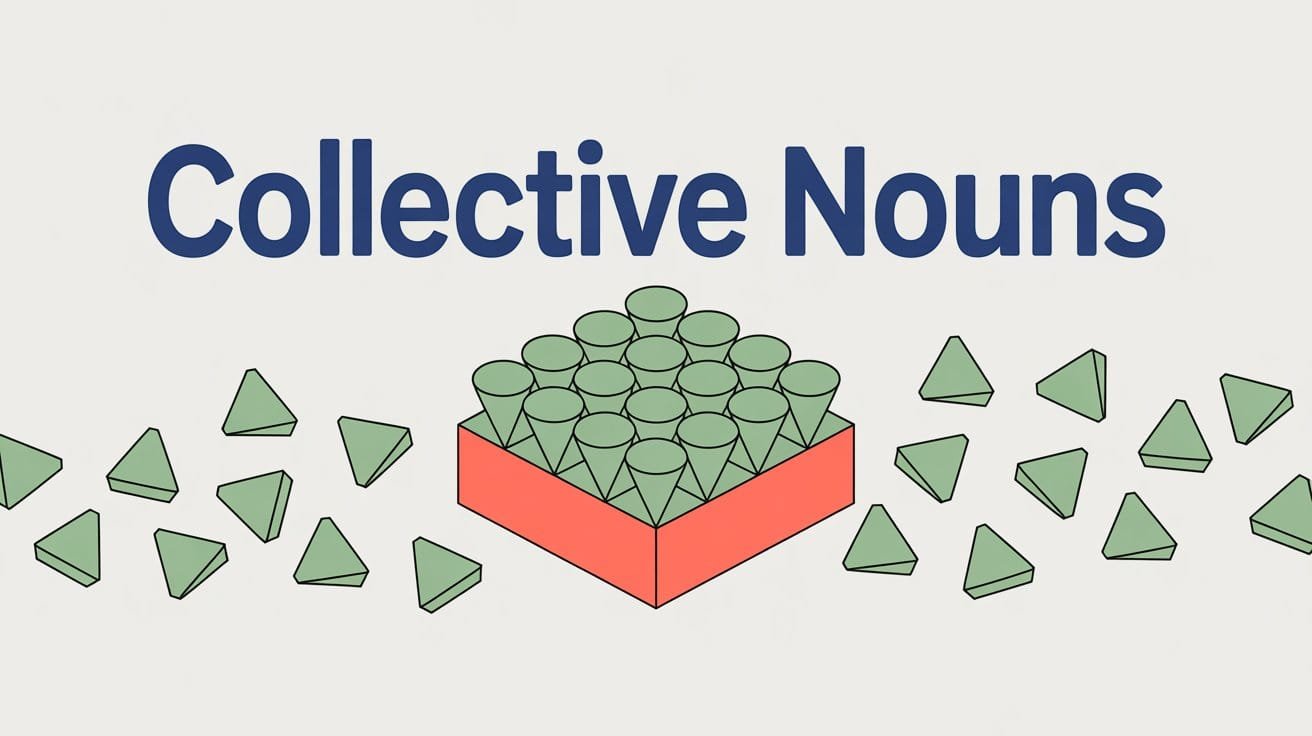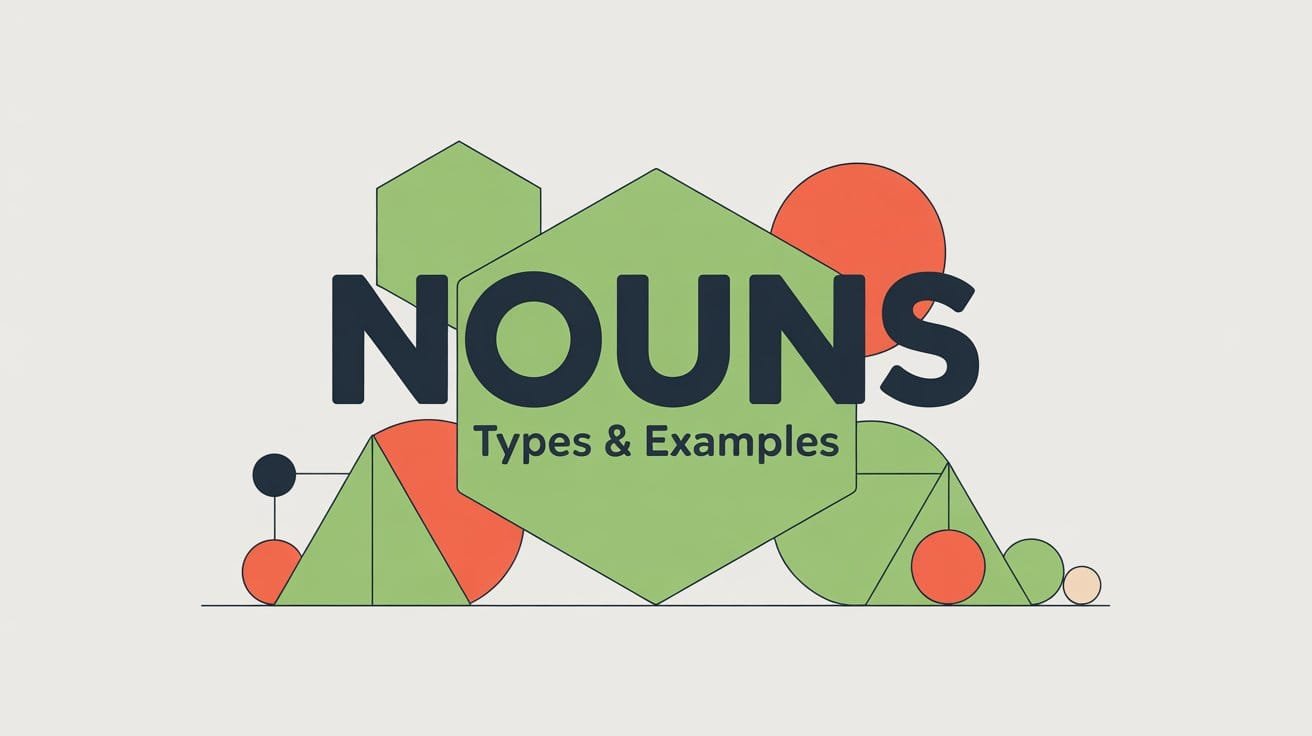Some nouns refer to just one person or thing, like student, apple, or dog. Others refer to a group of people, animals, or objects treated as a single unit. These are called collective nouns.
Words like team, flock, committee, and audience are all collective nouns. Even though they refer to multiple members, they are usually treated as one group in a sentence. In this guide, you’ll learn what collective nouns are, how they behave in sentences, how to use them correctly, and how they differ from other types of nouns.
What Is a Collective Noun?
A collective noun is a word that refers to a group of people, animals, or things as a single unit. Even though the group contains multiple members, the noun itself is treated as singular or plural depending on how it’s used in the sentence.
Examples of collective nouns include:
- family (a group of related people)
- team (a group working together)
- flock (a group of birds)
- committee (a group formed to make decisions)
Sentence Example:
- The committee has submitted its final report.
In this sentence, committee refers to several people but is treated as one unit, so it takes a singular verb (has).
Collective nouns are common in both spoken and written English and are especially useful when referring to organized groups or sets.
Characteristics of Collective Nouns
They represent a group as one
A collective noun refers to a group made up of individuals, but the noun itself is singular in form.
Example: The audience is clapping.
They are usually common nouns
Most collective nouns are general terms for groups and are not capitalized unless they begin a sentence.
Example: A flock of geese crossed the road.
Subject-Verb Agreement with Collective Nouns
The verb you use with a collective noun depends on how the group is being understood in the sentence. In some cases, the group is treated as one whole; in others, the focus is on the individuals within it. This also changes slightly depending on the variety of English you’re using.
Use a Singular Verb When the Group Acts as One Unit
When the group is performing a single action together or is seen as a single entity, use a singular verb.
Examples:
- The team is preparing for the final match.
- Our class meets every Monday.
- The committee has made its decision.
Here, the group is acting as one, so the verb stays singular.
Use a Plural Verb When the Focus Is on Individual Members
If the members of the group are acting separately or are being considered as individuals, use a plural verb, especially in British English.
Examples:
- The team are celebrating in their own ways.
- The jury were arguing among themselves.
- The staff have taken their seats.
In these examples, attention is on what each person in the group is doing, not the group as a whole.
Verb Choice May Vary by Region
Subject-verb agreement with collective nouns may also vary between American and British English.
In American English, collective nouns are almost always treated as singular, unless the sentence has a very clear focus on individuals.
- ✔ The band is playing at the concert.
- ✔ The government has issued a new policy.
In British English, it’s more common to use plural verbs when referring to the group members individually.
- ✔ The band are packing up their instruments.
- ✔ The government have introduced new guidelines.
When in doubt, think about the meaning you want to express—unity or individuality—and match the verb accordingly.
Common Categories of Collective Nouns
Collective nouns can be grouped based on what they refer to—people, animals, or things. Here are some common categories and examples:
1. Groups of People
Used to describe organized or informal gatherings of individuals.
Examples:
- team
- committee
- audience
- staff
- jury
- crew
2. Groups of Animals
Many animal-related collective nouns are specific and unique.
Examples:
- herd (of cattle)
- flock (of birds)
- swarm (of bees)
- pack (of wolves)
- gaggle (of geese)
- pod (of dolphins)
3. Groups of Things
Used for collections or sets of objects.
Examples:
- fleet (of ships)
- collection (of stamps)
- stack (of books)
- bunch (of grapes)
- set (of tools)
Collective Noun Examples in Sentences
- The jury has delivered its final decision.
- Our class is planning a trip to the museum.
- The staff were given new ID cards.
- A herd of deer crossed the road at sunrise.
- The flock is migrating south for the winter.
- We watched a pack of wolves in the documentary.
- The fleet of trucks arrived early.
- She showed me her collection of vintage coins.
- A stack of books was piled on the desk.
Collective Noun vs. Common Noun
While both collective nouns and common nouns are general terms, they function differently in a sentence.
Collective nouns describe multiple members acting as one unit. Even though the noun is singular in form, it often represents many individuals or items.
Example: The committee meets every Friday.
→ “Committee” is one word representing several people.
Common nouns, on the other hand, describe general, singular things, not groups.
Example: The teacher arrives early every day.
→ “Teacher” refers to one person, not a group.
| Collective Noun | Common Noun |
|---|---|
| class | student |
| herd | cow |
| team | player |
| pack | dog |
How to Identify Collective Nouns
Look for nouns that suggest a group
If the word refers to more than one item treated as one, it’s likely a collective noun.
Examples: team, flock, group, audience
Pay attention to sentence structure
Collective nouns are usually followed by a singular verb when the group is seen as a whole.
Example: The family enjoys hiking together.
Think about what the word represents
If it refers to a collection, set, or group—even without listing members—it’s a collective noun.
Example: The committee voted unanimously.
(You don’t need to list who’s on the committee—it’s still a group.)
FAQs About Collective Nouns
Can collective nouns be pluralized?
Yes. While the singular form refers to one group (committee), you can pluralize it when talking about multiple groups.
Example: Several committees met during the conference.
Do collective nouns always take singular verbs?
Not always. In American English, they usually take singular verbs. In British English, they can take plural verbs when the group is seen as acting individually.
Example:
The staff is working late. (American)
The staff are working late. (British)
Are collective nouns considered common or proper nouns?
Most collective nouns are common nouns because they refer to general groups. However, if they’re part of a specific name (The Supreme Court, The Beatles), they’re treated as proper nouns.
How do collective nouns differ from countable and uncountable nouns?
Collective nouns refer to groups, countable nouns refer to individual items you can count, and uncountable nouns refer to things you can’t count directly (like milk or honesty).
Example:
Collective: team
Countable: player
Uncountable: information




awesome